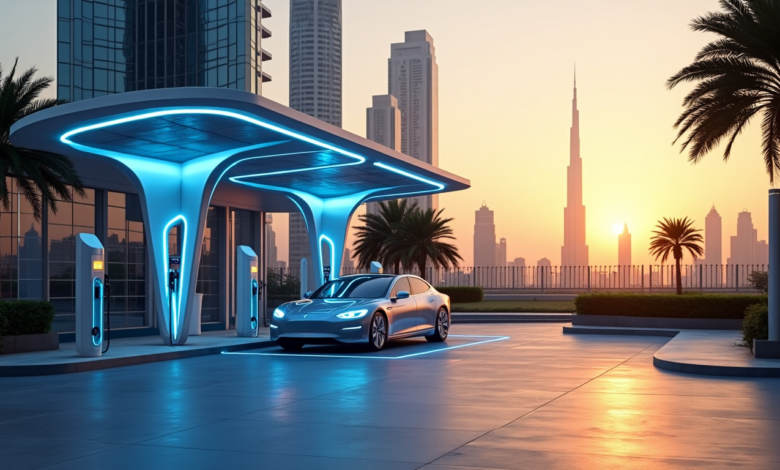
Dubai’s DEWA Unveils 740 New EV Charging Points to Drive Green Mobility
Dubai’s electric vehicle revolution has reached a most important milestone with DEWA expanding its EV charging network to 740 stations across the city. Dubai now stands among the world’s leading cities in eco-friendly transportation infrastructure. The Dubai Electricity and Water Authority (DEWA) strengthens the emirate’s position as a global hub for electric vehicles through its extensive charging station network. DEWA’s strategically placed stations serve electric vehicle owners and support the emirate’s vision for a sustainable future. The detailed charging network shows Dubai’s dedication to reducing carbon emissions and offering clean transportation solutions to residents and visitors.
Dubai’s EV Infrastructure Milestone
Dubai Electricity and Water Authority‘s charging infrastructure has shown impressive expansion. The network now has more than 740 EV Green Charger points throughout the emirate. This network serves an electric vehicle community that grows faster each day and has reached 34,970 vehicles as of October 2024.
DEWA’s detailed charging infrastructure has charging options of all types that match different user needs:
- Ultra-fast chargers for rapid power delivery
- Fast charging stations for efficient refueling
- Public charging points for convenient access
- Wall-box chargers for residential use
The numbers show this initiative’s soaring win. 16,828 customers have used the service since its 2014 launch through September 2024. DEWA has provided 31,674 megawatt hours of electricity to electric vehicles during this time. Users can find charging stations easily through 15 digital platforms, including DEWA’s website and smart application.
DEWA has taken a most important step toward private sector involvement. The authority has given its first Independent Charge Point Operator (CPO) licenses to Tesla and UAEV. This matches Dubai’s detailed Regulatory and Licensing Framework for EV charging infrastructure. The emirate aims to achieve its net-zero carbon emissions target by 2050.
Economic and Environmental Impact
DEWA’s expanded EV charging network brings major environmental and economic advantages to Dubai. The initiative has helped reduce carbon emissions by 236,700 tons as of April 2023. This marks a big step toward environmentally responsible practices.
The UAE has set bold targets for its green mobility shift:
- Cut energy use in transport sector by 40%
- Lower carbon emissions by 10 million tons by 2050
- Make EVs 50% of all vehicles on UAE roads by 2050
EVs cost less to run than traditional vehicles. The network has supplied about 31,674 megawatt hours of electricity to electric vehicles. This shows how more people are choosing eco-friendly transportation options.
The UAE plans to mix renewable and nuclear energy sources to reach carbon neutrality by 2050. Government support includes free vehicle registration, parking spaces, and lower charging fees.
Private companies play a vital role in this shift. DEWA’s new Independent Charge Point Operator licenses have strengthened the EV infrastructure ecosystem. This collaboration between public and private sectors will attract more investment in green mobility. It creates business opportunities while helping Dubai meet its sustainability goals.
Public-Private Partnership Success
DEWA has launched a complete regulatory and licensing framework that helps develop and operate EV charging infrastructure in Dubai. This framework represents a radical alteration from traditional infrastructure development to a shared public-private partnership model.
The partnership model has achieved several wins:
- Tesla and UAEV received their first Independent Charge Point Operator licenses
- DEWA combines its direct infrastructure with third-party operators in a dual development approach
- Charging stations are placed at petrol stations and major entry and exit points across the emirate
DEWA’s framework helps private sector participation while ensuring high operational standards. The initiative includes specific licensing requirements for operators who provide free and paid charging services. This well-laid-out approach has drawn substantial investment. The Mohammed bin Rashid Al Maktoum Solar Park has attracted AED 50 billion in investments.
DEWA aims to grow its network to 1,000 charging stations by 2025 with ultra-fast charging capabilities. These plans line up with Dubai’s goal to have 50% of vehicles on its roads be electric by 2050. The public-private partnership model’s success shows in DEWA’s ISO 44001 certification for joint business relationship management. DEWA stands as the first organization in the Middle East and Africa to earn this recognition.
DEWA’s extensive EV charging network is evidence of Dubai’s dedication to environmentally responsible transportation. The emirate has built reliable infrastructure that supports over 34,970 electric vehicles through planned placement of 740+ charging stations and successful public-private partnerships. These achievements have helped Dubai meet its environmental goals and showed a reduction of 236,700 tons in carbon emissions.
Dubai’s complete approach merges infrastructure development with regulatory frameworks and private sector collaboration. This creates a model for environmentally responsible urban mobility. DEWA plans to reach 1,000 charging stations by 2025, which deepens Dubai’s commitment to its vision of having 50% electric vehicles on its roads by 2050. This bold initiative makes Dubai a global leader in environmentally responsible transportation and creates a cleaner, greener future while keeping its position as a pioneer in urban innovation.






